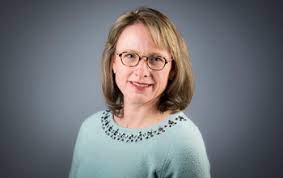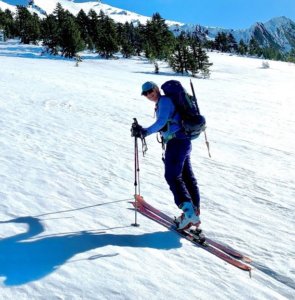
Board of Governors – Kendra Sharp
Meet Dr. Kendra Sharp, an engineer who loves creating international partnerships

As a mechanical engineer, Dr. Kendra Sharp knows a lot about what it takes to build things. She’s also enthusiastic about another important foundation – the building of trust between nations.
Now that she’s been selected by the United States government to be the U.S. representative to the BSF Board of Governors, Sharp can apply what she has learned with more than 20 years of experience as an active researcher as well as a strategic perspective on international collaboration for U.S. researchers.
“As a member of the BSF Board of Governors, I have the opportunity to better understand BSF’s mission,” she said. “This informs NSF’s work to promote international collaboration within the research community, including collaboration between NSF and BSF.”
That collaboration is now in its 10th year and has grown to encompass no less than 27 funding programs, making this one of the NSF’s most extensive international partnerships. This would be an achievement for any country, but it is especially significant given Israel’s size and population compared with many others on the world stage. Sharp is not surprised by Israel’s scientific achievements, or by the size of the NSF-BSF program.
“As a nation, Israel has a strong emphasis on innovation and has globally recognized experts in all fields of science and engineering,” she said. “The success of our partnership is directly attributable to the excellence in both of our nations and the willingness of our research communities to work together to advance the frontiers of knowledge.”
Sharp has devoted much of her career to encouraging international cooperation in science and engineering. Sharp is a professor of mechanical engineering at Oregon State University (OSU), currently on loan to the U.S. National Science Foundation where she has been serving as the Head of the Office of International Science and Engineering since February 2021.
At OSU, she served as Senior Advisor for Global Affairs, where she provided leadership for the development and implementation of strategic initiatives in internationalization and global engagement. She also founded OSU’s Humanitarian Engineering Program.
“My experience, both as a Professor of Mechanical Engineering and as Senior Advisor for Global Affairs, gives me a valuable perspective on both the value and the challenges of international collaboration. To promote international collaboration, we need to reduce barriers for researchers themselves. The NSF-BSF partnership model is an excellent example of how we can reduce barriers,” she said.
Sharp believes deeply in the value of interdisciplinary education and research, as well as using engineering and technology for positive social impact.
“There are many ways that engineering and technology are being used for positive social impact, such as increasing access to clean water, improving community resilience through adaptation to climate change, or addressing the root problems of climate change through mitigation,” she said.
She has extensive international research and teaching experience in the Netherlands, New Zealand, Pakistan, and Thailand. She is an elected Fellow of the American Society of Mechanical Engineering. Recent awards include an Erskine Fellowship at the University of Canterbury (New Zealand), the OSU College of Engineering’s Faculty Mentoring Award, the American Society of Mechanical Engineering’s Edwin F. Church Medal, and OSU’s International Service Award. She was also an American Association for the Advancement of Science/American Institute of Physics Congressional Science Fellow in the U.S. Senate in 2001.
Like many scientists and engineers, Sharp excelled in science and math in high school. As a result, she was encouraged to pursue engineering.
“I chose aerospace engineering as my major in college, because I was interested in airplanes and flight,” she said.
She received her Ph.D. and B.S. degrees from the University of Illinois at Urbana-Champaign, and master’s degrees from the University of Cambridge and the University of California-Berkeley.

When she’s not promoting international science and engineering cooperation, she can often be found exploring the great outdoors.
“I’m an avid hiker, biker, and skier,” she said. “Living in the Pacific Northwest for the last 12 years has given me tremendous access to outdoor recreation.”
She also enjoys photography, and loves digging into some of the more technical aspects of that field.
“That does link back to my extensive research experience with image-based diagnostics for fluid mechanics,” she said.
Fluid mechanics involves the study of fluid behavior, such as liquids, gases, blood, and plasmas, at rest and in motion. It has a wide range of applications in mechanical and chemical engineering – fields that involve a love of research and intellectual curiosity. Sharp believes these are also traits that many U.S. and Israeli scientists have in common, and she looks forward to promoting further scientific partnerships between the two nations.
“Mutual respect coupled with shared values serve our collaboration well, ensuring that we come together on equal footing,” she said.
